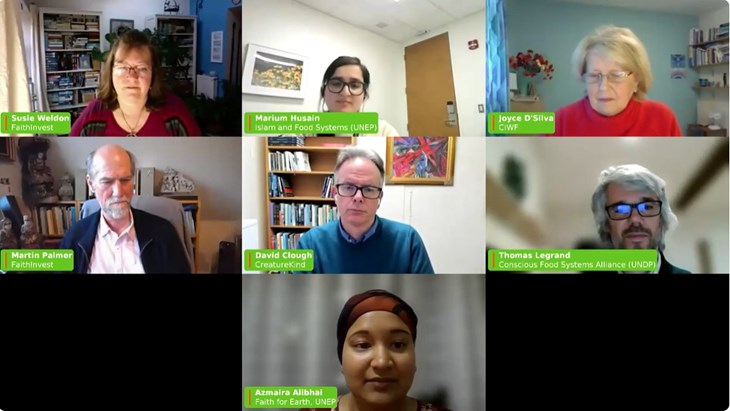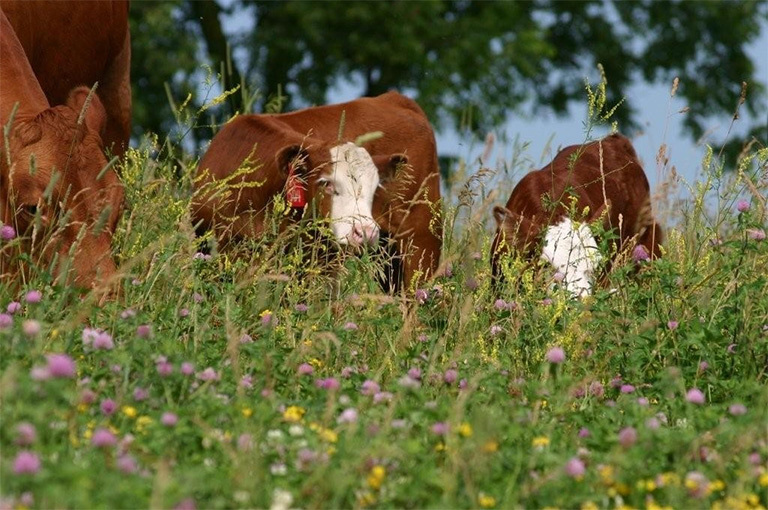Faith leaders share hope for future of food
Published 1/23/2024

The potential of faiths to change food systems was the topic of discussion at an international webinar attended by people from over 30 countries. We co-hosted Faith action for better human, animal and planetary health with partners Conscious Food Systems Alliance (UNDP), Faith for Earth (UNEP) and FaithInvest on 18 January.
The first in a series of webinars exploring in greater depth issues discussed at our Extinction or Regeneration conference, Faith action for better human, animal and planetary health looked at how to fix our broken global food system through the lens of faith. Representatives from a variety of faiths took part, considering what role faith leaders have in the food system transformation discussion and how they can influence decision-makers to effect lasting change to secure better human, animal and planetary health.
Faith leaders have great influence
Over 80% of the global population (1) say they follow a particular religion, meaning faiths can play a vital role in effecting change. With the United Nations identifying food system transformation as an urgent priority, there is a huge opportunity for faith leaders to exert their influence in this space.
Our global CEO Philip Lymbery introduced the webinar, commenting: “Faiths have the potential to change food systems...many are already taking action...but how can we inspire more change, towards the food systems transformation that all our futures is depending on?"
Activist, academic and campaigner, Dr Vandana Shiva spoke about how ancient Indian spiritual wisdom brings compassion into food systems. She called for respect for the planet we inhabit and the need to recognise that all living beings and our wider ecosystem are part of the food cycle, commenting: “Being human is growing food with care and compassion.”
Diverse speakers voice concern for our planet
The speakers – representing a cross section of faiths and roles – all shared a profound concern for the future of our planet, and how we can feed a growing population whilst being respectful to the environment and ensuring compassion to animals.
Not only does our food system result in the intense suffering of billions of farmed animals, but more than 3.1 billion people in the world cannot afford a healthy diet (2) and 900 million people faced food insecurity at severe levels in 2021 (3).
David Clough, Chair of Theology and Applied Sciences, University of Aberdeen and co-founder, CreatureKind, said: “There is ample evidence in the Christian bible that animals…should not be subjected to unnecessary cruelty…and I want to make the case among fellow Christians that they need to make the link between their consumption and their faith.”
Rabbi Yonatan Neril, founder of The Interfaith Center for Sustainable Development spoke similarly about the Jewish faith, citing passages from the scriptures highlighting that God’s vision for people was for them to eat plants, and furthermore, that they should not take life to sustain life.
Our Ambassador Emeritus, Joyce D’Silva shared quotes from many leading faith scriptures encouraging respect and care for animals, commenting: “It's an anomaly to me that the teachings and examples are all there, but the dreadful exploitation of animals is continuing."
Solutions give us hope
Martin Palmer, Founding President, FaithInvest believed the faiths had a huge opportunity for influence commenting: “If we are 80% of the world, we are probably the problem...therefore we are also the solution."
Thomas LeGrand, Lead Technical Advisor, Conscious Food Systems Alliance (UNDP) spoke about integrating consciousness approaches into food systems initiatives. He believes the framing of the discussion needs to be changed, and that we should promote narratives around food to encourage a shift away from damaging industrial animal agriculture. "There are other ways to think about food systems challenges... hunger, health problems etc. than the ones that are traditionally put forward," he commented.
Azmaira Alibhai, Faith & Ecosystems Coordinator at Faith for Earth, UNEP, sees collaboration as the answer, saying: “When we see a diversity of experiences, that’s where we excel as a faith network.” She believes faith actors need to be part of the multi-stakeholder mapping and consultation around food systems transformation, rather than being an afterthought.
Dr Marium Husain, who presented an Islamic perspective on our food system, concluded positively that there are simple mechanisms and practices that faiths give us that we can implement for a more positive future. She commented: “We have the tools and resources; it’s a choice - we just need to do it”.
Martin Palmer further echoed this sentiment, commenting: “We’ve heard these wonderful teachings – but how do we use them? We use them by saying to the faiths – are you faith consistent in your investment? We need to be faith consistent in everything – how we eat, how we behave and how we invest."
Vandana Shiva concluded: “When I asked every religion what their sacred texts say about food…every one said ‘feed the hungry’ and ‘grow food in abundance’. So that is what we have to do.”
Concluding the webinar, Philip Lymbery summarised the session with a message of hope: “Diverse speakers, one goal - to change food systems for the benefit of people, animals and the planet. Faith involvement can be a game changer, for food, for animals, for the future of people everywhere, moving us away from a future that otherwise looks bleak… We can recognise the links between animals, their consumption, and our faith; we can advance the world by embracing the beautiful life-affirming, compassionate solutions that are out there…. In this way we can save the future, the future really is down to us.”
“I’m so pleased we’ve started this important conversation…to inspire people of faith everywhere to get involved in transforming food and farming systems, in creating better human, animal and planetary health.”
Watch Faith action for better human, animal, and planetary health here.
